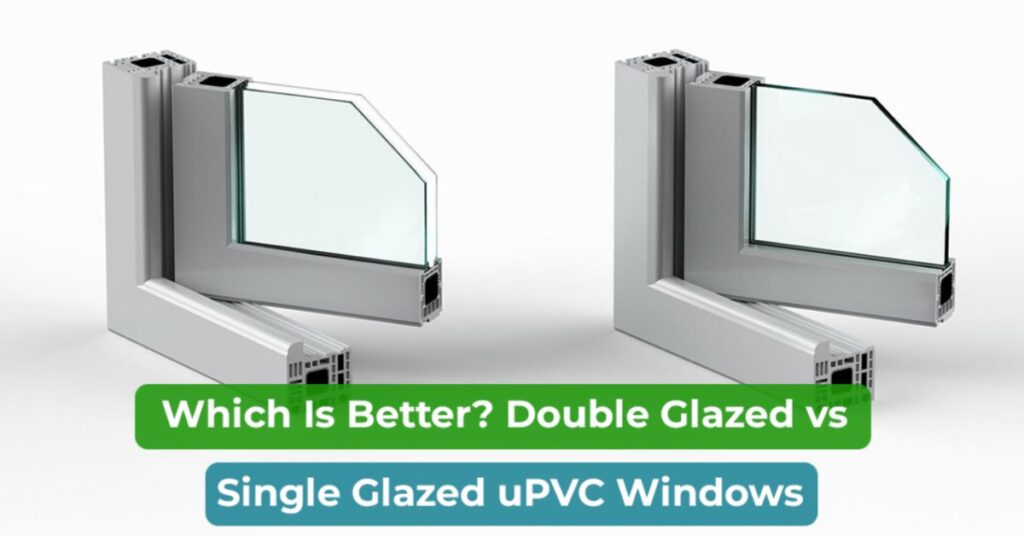Single Glazing uPVC Window vs Double Glazing uPVC Window: Which One Should You Choose?
When choosing windows for your home, one of the biggest decisions is whether to install a Single Glazing uPVC Window or a Double Glazing uPVC Window. This choice can significantly impact your home’s energy efficiency, comfort, and noise control.
If you’ve been searching for “Single Glazing vs Double Glazing”, this guide will help you understand the differences, advantages, and disadvantages of both options—so you can make the right choice for your home.
What Is a Single Glazing uPVC Window?
A Single Glazing uPVC Window has just one pane of glass set inside a durable uPVC frame.
- Affordable Option: More budget-friendly upfront.
- Quick Installation: Lightweight and easy to fit.
- Maximum Natural Light: Lets plenty of sunlight into your space.
Disadvantages of Single Glazing uPVC Window
- Low Energy Efficiency: Allows heat to escape in winter and enter during summer.
- Minimal Noise Insulation: Does little to block traffic or street noise.
- Prone to Condensation: Can fog up in humid or cold weather.
- Lower Security: Easier to break compared to double-glazed windows.
What Is a Double Glazing uPVC Window?
A Double Glazing uPVC Window contains two panes of glass, separated by a small gap filled with air or insulating gas such as argon. This design makes the window far more efficient and effective at keeping your home comfortable.
Advantages of Double Glazing uPVC Window
- Superior Energy Efficiency: Helps maintain indoor temperature, reducing energy bills.
- Better Noise Reduction: Blocks external noise—perfect for homes near busy streets.
- Higher Security: Two glass layers make it harder to break.
- Condensation Control: Reduces fogging and moisture build-up on glass.
- Long-Term Savings: Lower power consumption leads to reduced heating/cooling costs.
Disadvantages of Double Glazing uPVC Window
- Higher Initial Cost: Requires more material and a professional installation.
- Heavier Design: May not suit old or weak window frames.
- Seal Maintenance: Needs to stay properly sealed to prevent moisture from entering.
Single Glazing uPVC Window vs Double Glazing uPVC Window: Key Differences
Feature | Single Glazing uPVC Window | Double Glazing uPVC Window |
Energy Efficiency | Low – heat easily transfers | High – great thermal insulation |
Noise Insulation | Minimal | Excellent |
Security | Easier to break | Much harder to break |
Cost | Budget-friendly upfront | Higher initial cost but saves money over time |
Condensation Control | Prone to fogging | Great at preventing condensation |
Maintenance | Simple to clean | Needs seal checks occasionally |
Installation | Lightweight, quick install | Requires skilled installation |
Which One Should You Choose?
The decision between a Single Glazing uPVC Window and a Double Glazing uPVC Window depends on your home’s location, budget, and comfort preferences:
- Choose Single Glazing uPVC Window if you live in a quiet area, have a tight budget, or are renovating an older property where maintaining the original style is important.
- Choose Double Glazing uPVC Window if you want better insulation, lower electricity bills, and less noise inside your home—especially in cities or extreme climates.
Think of a Double Glazing uPVC Window as an investment in comfort and efficiency. It might cost more initially but pays off in energy savings and improved home value.
FAQs on Single Glazing uPVC Window vs Double Glazing uPVC Window
Q1: Is a Double Glazing uPVC Window really more energy-efficient?
Yes, it reduces heat transfer, keeping your home warmer in winter and cooler in summer—saving money on energy bills.
Q2: Can I upgrade from a Single Glazing uPVC Window to a Double Glazing uPVC Window?
Yes, most modern uPVC frames can be fitted with double glazing. A professional installer can confirm compatibility.
Q3: How long does a Double Glazing uPVC Window last?
Typically 20–25 years with proper maintenance, as long as the seals remain intact.
Q4: Does a Double Glazing uPVC Window block all noise?
Not completely, but it significantly reduces outside noise like traffic, construction, or barking dogs.
Q5: Are Single Glazing uPVC Windows still a good option?
Yes, if you live in a mild climate, want a cost-effective solution, or are renovating a heritage property.
Q6: Which window option is best for security?
A Double Glazing uPVC Window is stronger and harder to break, offering better protection against intruders.

